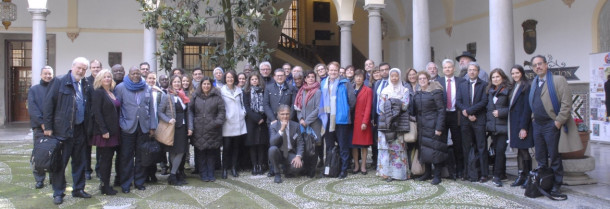 Metropolis
Metropolis
Metropolis participates in the "Global Expert Meeting"
From March 20 to 23 the “Global Expert Meeting” was held in the city of Granada, with the objective of preparing the quadrennial monitoring report of the New Urban Agenda (NAU). The meeting was organized by UN-Habitat, with the logistical support of UN-Habitat Spain, and with the participation of the Project Officer for Metropolis Observatory, Mr. Eugeni Villalbí, and of UCLG, represented by the Global Observatory on Local Democracy and Decentralization (GOLD) with Eduardo Bilsky and Andrea Ciambra. The meeting highlighted the idea that metropolitan spaces are emerging as necessary spaces to be taken into account in order to monitor and implement the agendas.
One of the sections of the NAU, specifically, the tracking and monitoring section approved in Quito, addresses that the General Assembly of the United Nations may request the Secretary General to present a report every four years on the level of implementation of the Agenda. It is established that this report has to be quadrennial (QR), and that the first of them has to take place in September 2018, incorporating contributions from countries and from regional and international organizations.
Strengthen alliances
One of the sections of the NAU, specifically, the tracking and monitoring section approved in Quito, addresses that the General Assembly of the United Nations may request the Secretary General to present a report every four years on the level of implementation of the Agenda. It is established that this report has to be quadrennial (QR), and that the first of them has to take place in September 2018, incorporating contributions from countries and from regional and international organizations.
Strengthen alliances
Strengthen alliances between the different partners, develop a strategy and a guide for future quadrennial reports and create a draft document to present as the first quadrennial report were some of the objectives of the meeting. To achieve these goals, the seminar involved more than 50 experts from different regions, disciplines, public, private and academic sectors, international networks and associations, United Nations agencies and some political profiles.
During the sessions of the “Global Expert Meeting” the Writeshop methodology was used, which involved the participation of all the experts distributed in different fields. This practice was chosen because it is the first report to be presented at the United Nations Assembly. The participants discussed and drafted the document in situ for each of the chapters, while at the same time participating in the creation of documents from other chapters already worked by another group of experts.
The developing work and the final draft were structured around four blocks or chapters:
During the sessions of the “Global Expert Meeting” the Writeshop methodology was used, which involved the participation of all the experts distributed in different fields. This practice was chosen because it is the first report to be presented at the United Nations Assembly. The participants discussed and drafted the document in situ for each of the chapters, while at the same time participating in the creation of documents from other chapters already worked by another group of experts.
The developing work and the final draft were structured around four blocks or chapters:
1) Conceptual framework
2) Data, trends and challenges in global and sustainable urbanization
2) Data, trends and challenges in global and sustainable urbanization
3) Development of a coherent and inclusive monitoring system
4) An effective implementation
It should be noted that in all of them the idea of creating effective instruments for a real monitoring and implementation of the NUA emerged. At the same time, the need to incorporate an integral vision between the implementation of the national and subnational governments (regional, metropolitan and local) was raised. Finally, the idea of establishing mechanisms of comparison and coherence between different agendas was shared, mainly between the NUA and the Agenda 2030, but also with other global agendas.
The role of Metropolis
The role of Metropolis
During the session the idea that metropolitan spaces are appearing as necessary spaces that must be taken into account in order to monitor and implement the agendas was reinforced. Thus, the need to promote multilevel governance spaces was present in the debate and, also, in the document. The emergence of metropolitan spaces appeared in different round tables and sections of the document, among which the need to get data and indicators at this scale, the emergence of certain problems that need a metropolitan approach (gentrification, mobility, etc.) or the need to build financing tools and training of technical teams that can implement these agendas stand out.
The meeting was a good opportunity to exchange points of view, experience and knowledge and to work together with a team of experts on different topics. The sessions were a bottom-up exercise, which will serve for the preparation of future QR reports and as a basis for the document that UN-Habitat will continue to work on to present in the internal debates of the United Nations. In this way, it will be the Secretary General of the United Nations who will present it to the General Assembly.
The meeting was a good opportunity to exchange points of view, experience and knowledge and to work together with a team of experts on different topics. The sessions were a bottom-up exercise, which will serve for the preparation of future QR reports and as a basis for the document that UN-Habitat will continue to work on to present in the internal debates of the United Nations. In this way, it will be the Secretary General of the United Nations who will present it to the General Assembly.

